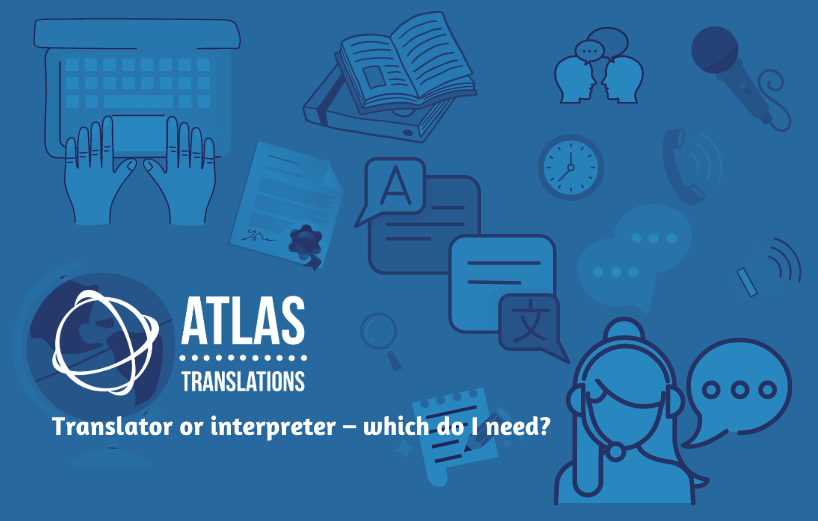Translator or interpreter – which do I need?

As a translation agency, we are sometimes asked to provide a translator for a meeting, which can create a small confusion. If you’re not a part of the translation industry, you may not realise that translators do not necessarily work with both the written and spoken word. In this post, we explain the difference between a translator and an interpreter, and about the two main types of interpreting.
Difference between an interpreter and a translator
To put it simply, a translator translates written content – from birth certificates to reports, books or websites. On the other hand, an interpreter translates the spoken word in real time. Both translators and interpreters have deep knowledge of the language and culture in which they work. However, each of them requires a slightly different skill set. Where the translator should ideally have excellent writing and research skills, the interpreter has to be well-practised at memorising and finding words on the spot.
Now that this is out of the way, it’s important to note that there are two types of interpreters.
Consecutive interpreter
Let’s say you have a business meeting with someone from abroad who doesn’t speak your language. Or you are abroad and have a sudden dental or doctor’s appointment, but unfortunately know just a few basic words in the local language. In those situations, a consecutive interpreter can be a lifesaver! When consecutive interpreting is involved, the interpreter makes notes while listening to the speaker. Once the speaker is finished, the interpreter repeats what was said in the target language.
Being a translation agency, we often receive requests for interpreters to attend court hearings, interviews, and medical or business appointments. Whether you need an interpreter to attend the meeting in person or remotely, we can help you to find the right person for the job. We can often make it work even if you need someone the next day! Just remember that when using the services of a consecutive interpreter, it is important to pause frequently, ideally every few sentences.
Simultaneous interpreter
The other type involves instantaneous interpreting. Simultaneous interpreters assist during live conferences for listeners from around the world. You may recognise simultaneous interpreting from TV news. For example, when a politician from another country is making an important speech and it’s being translated live.
Simultaneous interpreters have to listen, translate and speak all at once, which requires deep concentration and focus. To avoid interpreter fatigue, simultaneous interpreters often work in pairs and switch every 30 minutes. By working in a team they can also help each other by noting down any figures or complex vocabulary to make the process run as seamlessly as possible.
Since it requires instant reproduction, simultaneous interpreting is a highly skilled service and requires interpreting equipment. As a result, it tends to cost more than consecutive interpreting and can take longer to organise. If you’re hosting a conference with delegates from different countries and need to hire simultaneous interpreters, we recommend organising the service well in advance.
Can you be both a translator and an interpreter?
Yes! One certainly doesn’t exclude the other. Some of our suppliers offer both translation and interpreting services, and are equally eager to do both. Others prefer to focus just on translation or interpreting. It’s also often the case that the interpreter offers only consecutive interpreting or simultaneous interpreting. That’s why it’s so important to know the difference between these services and clearly communicate your needs.
Whether you’re looking for a translator, consecutive interpreter or simultaneous interpreters, we can help you find them. Just give us a call on 01727 812725 or email team@atlas-translations.co.uk and we’ll get the ball rolling for you.














